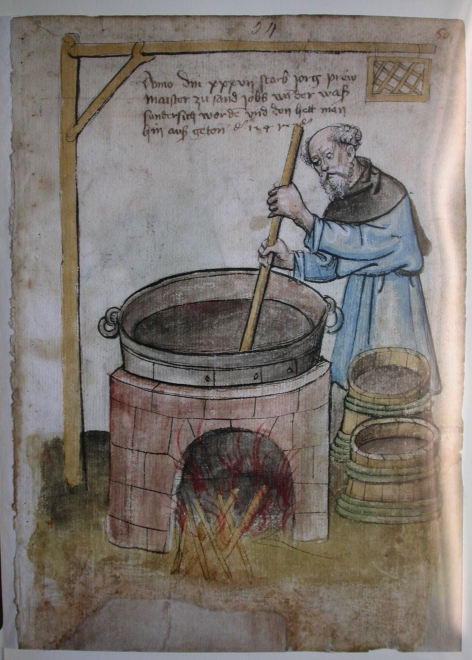Pliny the Elder, Natural History 14.29
“The people of the west have their own alcohol made from soaked grain in many different ways in Gaul and Spain with many different names but with the same idea. The people of Spain have already taught us that these kinds of beverages will last even a long amount of time.
Egypt, too, has worked out a similar drink made from grain and in no corner of the world does intoxication ever take a break. They even drink this type of beverage without diluting them as one does with wine. But, by Hercules, that land used to seem to offer grains alone. Alas, the miraculous inventiveness of vice! A way has also been found to make water intoxicating!”
. Est et occidentis populis sua ebrietas e fruge madida, pluribus modis per Gallias Hispaniasque, nominibus aliis sed ratione eadem. Hispaniae iam et vetustatem ferre ea genera docuerunt. Aegyptus quoque e fruge sibi potus similis excogitavit, nullaque in parte mundi cessat ebrietas; meros quippe hauriunt tales sucos nec diluendo ut vina mitigant; at, Hercules, illic tellus fruges parare videbatur. heu, mira vitiorum sollertia! inventum est quemadmodum aquae quoque inebriarent.
Julian the Apostate, Epigrams 1
“Who are you and where are you from Dionysus? By the Bakhos true
I know only the son of Zeus and I do not know you.
He smells like nektar, but you smell like goat.
Did the Celts make you from grain because of their lack of grapes?
Ah, we should call you not Dionysus, but Demetrios instead.
And Bromos*** not Bromios since you are born of wheat**.”
Τίς πόθεν εἶς Διόνυσε; μὰ γὰρ τὸν ἀληθέα Βάκχον,
οὔ σ᾿ ἐπιγιγνώσκω· τὸν Διὸς οἶδα μόνον.
κεῖνος νέκταρ ὄδωδε· σὺ δὲ τράγου. ἦ ῥά σε Κελτοὶ
τῇ πενίῃ βοτρύων τεῦξαν ἀπ᾿ ἀσταχύων.
τῷ σε χρὴ καλέειν Δημήτριον, οὐ Διόνυσον,
πυρογενῆ μᾶλλον καὶ Βρόμον, οὐ Βρόμιον.
Aeschylus fr. 124 from Lykourgos (from Athenaeus 10.447c)
“He used to drink beer from these [heads] once he dried them
And then boast proudly about it in his man-cave.”
κἀκ τῶνδ᾿ ἔπινε βρῦτον ἰσχναίνων χρόνῳ
κἀσεμνοκόμπει τοῦτ᾿ ἐν ἀνδρείᾳ στέγῃ
The note from the Loeb attributes an understanding of this fragment to Hermann who compares it to Nonnos, Dionysiaca, 20.149–153, 166–181
Nonnos, Dion. 20.149-153
“The was a certain murderous man living there, of Ares’s line
Who was a mimic of his father’s wretched customs.
The criminal would drag faultless strangers to their doom,
That dread maniac Lykourgos, and then when he cut off
Their mortal heads with steel he hung them in his doorway…”
ἔνθα τις, ῎Αρεος αἷμα, μιαιφόνος ᾤκεεν ἀνήρ,
ἤθεσι ῥιγεδανοῖσιν ἔχων μίμημα τοκῆος,
ὀθνείους ἀθέμιστος ἀμεμφέας εἰς μόρον ἕλκων,
αἰνομανὴς Λυκόοργος· ἀποκταμένων δὲ σιδήρῳ
ἔστεφεν ἀνδρομέοισιν ἑὸν πυλεῶνα καρήνοις

